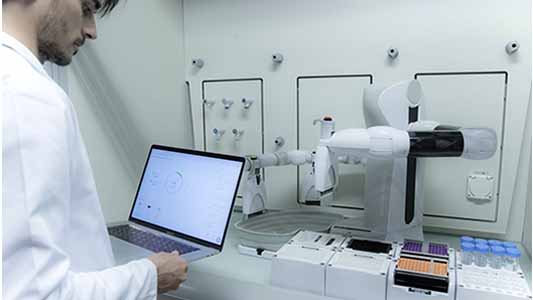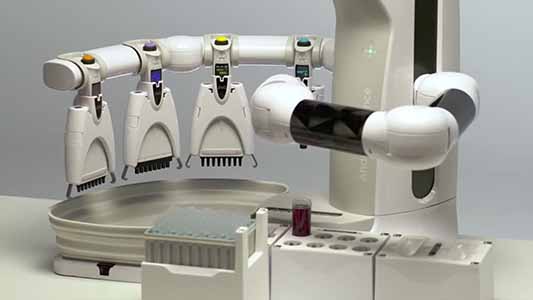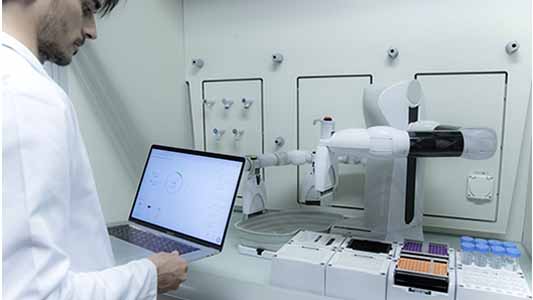Waters launched its first pipetting robot in 2013 to much acclaim and success. The product won multiple awards over the years and, more importantly, provided lots of data to Waters as feedback from users worldwide.
It seemed that laboratories around the world were facing the same challenges, being productivity and reproducibility. By listening to their customers and understanding their feedback, Waters spotted a gap in the market that was needed to drive operational efficiency: the need for a connected lab enabling the automation of the capture and flow of digital data from networked instruments within the lab, enabling more accurate results, reduced costs, greater efficiency, and improved ability to collaborate with other researchers around the world.
Connected Lab Automation

Driving the trend of connected lab automation devices and Lab 4.0, the team at Waters started developing Andrew+ for single and multi-channel pipetting, determined to deliver a complete ecosystem that increases operational efficiency whether it’s for cell biology, diagnostics, drug discovery, food testing, or genomics.
However, just like their customers, Waters also wants to focus on their central mission and increase operational efficiency. That’s why they teamed up with ADI Trinamic, as Jonathan Aubert, Electronic Engineer at Waters explains.
“If you need to work efficiently, you need to work in parallel. That’s why we teamed up with ADI Trinamic.”
Flexibility is Key
All in all, it took both companies 4 months to finish three servo drivers based on the maxon EC 45 flat motor and ADI Trinamic’s reliable building blocks, together with one stepper motor drive using the TMCM-1140 with Stall Guard as a safety feature. Together, these drives provide the extremely high accuracy needed for microplates using 8192 steps per motor rotation for an accuracy of up to 0.022 degrees. Most importantly, due to the excellent communication between the companies and the flexible TMCL-IDE, considerable amounts of development time and overhead cost were saved.
“The TMCL is a really flexible language, which is a key point if you want to develop something in a short timeline and still be flexible,” continues Jonathan Aubert. “That’s really important for us because it allows you to try out one solution and, if you find out it’s not the right solution, you can easily change and adapt the behavior of the components since it’s not hard-coded.”
Modular Solution with Increased Speed, Accuracy, and Versatility

Compared to the previous generation, Andrew+ is faster, more accurate, and more versatile, helping users worldwide to increase reproducibility of their processes, prevent health issues like repetitive strain injuries from manual pipetting, and enable lab technicians to work remotely and share information within the same lab or between different labs. All that’s needed is for one person to set everything up with the modular system and Andrew+ does the rest.
Once the number of tips, Dominos, and consumables are provided by the lab technician setting everything up, Andrew+ will perform its homing routine using three encoders. First, an absolute encoder at the output of the gearbox detects the position, followed by input from the Hall sensor to determine in which step it is. Finally, the drive is moved to known and repeatable end-signal generated by an incremental encoder to ensure all drives are in the correct position.
After the homing sequence, the application uses its arm to check everything is there according to the chosen protocol. This includes scanning the barcode on each Domino and counting the tips if there are any, as well as making sure the correct pipettes are in the tool stand with space for up to four pipettes. If needed, these smart electronic pipettes manufactured by Sartorius can also be used manually. Once everything’s in place, Andrew+ performs the task at hand with highest reliability and accuracy while users can focus on their central mission.
Providing the Complete Ecosystem
Key to this form of lab automation is the modularity of Andrew+ and the ecosystem around it provided by Waters. From the Andrew+, with various Dominos and wide range of pipettes from 200 nanoliters to 10 milliliters, to the Shaker+, Peltier+, and other additional connected devices, OneLab allows users to run daily experiments with efficient, error-free pipetting.
Saving time and health of laboratory technicians, the ecosystem makes Lab 4.0 affordable by making it accessible to anyone. The free and intuitive OneLab software means anyone can drag and drop their process together for Andrew+ to execute, increasing productivity and reproducibility to drive operational efficiency of labs across the world.

Connected Automated Lab Made Easy
In this video Jonas Proeger, Director of Business Management at ADI Trinamic talks about ADI Trinamic’s Solution Level Products that allow customers to accelerate their development and time to market. At ADI Trinamic, we are proud to be chosen as the motion control partner by Waters with their award-winning ecosystem.














